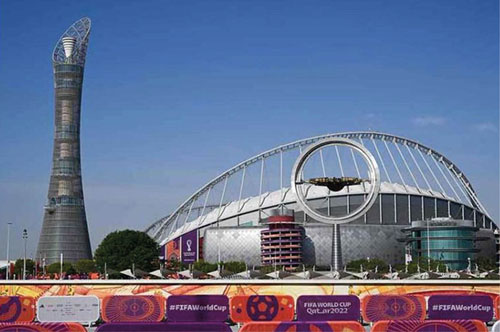FIFA’s president promised the World Cup would be like “Disneyland” while rights groups say workers have been through hell, but one thing is certain — there will never be another World Cup like Qatar 2022.
Few countries could have afforded the $200 bil-lion-plus bill that the tiny but super-wealthy emirate has paid for its spectacular transformation over the past 12 years.
The World Cup has become such an expensive and controversial behemoth that FIFA — still reeling from the votes for Russia 2018 and Qatar 2022 — may struggle to find a single country ready to shoulder the task of hosting.
The tournament is expanding to 48 teams when the circus moves to the United States, Canada and Mexico in 2026.
Qatar has been feeling the heat virtually since the day that its sports-crazy former emir, Sheikh Hamad bin Khalifa Al-Thani, celebrated securing the tour-nament at a vote in December 2010.
A FIFA investigation into vote-buying allega-tions ruled there was no hard evidence to take action. But most of the 22-member committee that backed Qatar were replaced or investigated for corruption.
The tournament had to be moved from its tradi-tional summer spot to the northern hemisphere winter because of Qatar’s scorching heat.
But the first World Cup in an Arab nation has come under the most intense fire over Qatar’s rights record — ranging from the deaths and wages of migrant workers to women’s rights.
Right up to kick-off, Amnesty International and Human Rights Watch (HRW) have been demanding that FIFA and Qatar sign up to $440 million workers’ compensation fund.
“The legacy of this World Cup 2022 depends on whether Qatar remedies with FIFA the deaths and other abuses of migrant workers who built the tour-nament, carries out recent labour reforms, and pro-tects human rights for all in Qatar — not just for visiting fans and footballers,” Rothna Begum of HRW told AFP.
Michael Payne, former International Olympic Committee head of marketing, suggested that Qatar would not be in the spotlight to such an extent were it not the host nation.
“If Qatar was not staging the World Cup, would there be any media coverage about human rights issues?” he asked.
1 ‘Double standards’
Qatar officials say their country has been the target of “racism” and “double standards”. They point to the reforms on working conditions and safety that have been hailed as groundbreaking in the Gulf region and are now talking of “legal” action.
The current emir, Sheikh Tamim bin Hamad Al-Thani, said there had been an “unprecedented cam-paign” against his country that has built extraordinary stadiums and new roads, hotels and museums for the event.
Gianni Infantino, chief of world governing body FIFA, proclaimed that Qatar would stage the “best-ever” World Cup on and off the field.
For the one million foreign visitors, it will be “like a child going to Disneyland for the first time and seeing the attractions and toys”, he told a press conference earlier this year.
Now the football multitudes are arriving to test those promises. They are finding beers at $13 a half litre in the FIFA fan zone and rooms ranging from $40 a night in a workers’ dormitory to thousands of dollars in palaces.
They are being watched by police from Turkey, Pakistan and Morocco, French gendarmes are advis-ing and Britain’s Royal Air Force is helping patrol the skies.
But the stadiums are all within 70 kilometres (43 miles) of each other, an array of rap stars have been lined up and public transport and emergency health-care are free.—AFP










